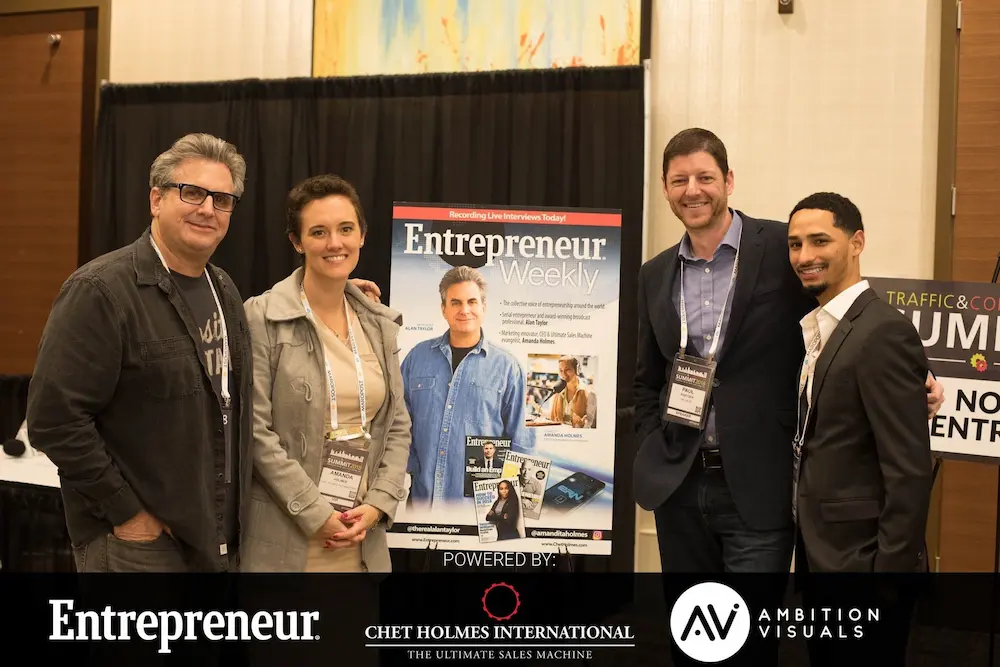At this year’s Traffic and Conversion Summit, Marketing AI Institute founder Paul Roetzer discussed artificial intelligence on Entrepreneur Weekly with Alan Taylor and Amanda Holmes of Chet Holmes International. The full recording can be found here, but we’ve pulled out the key takeaways for you below.
What Is AI?
The conversation started with the question “What is AI?” Before jumping into a more scientific answer, Roetzer prefaced:
“You use AI probably 100 times a day and you don’t realize it’s happening.”
For example, Facebook uses facial recognition to identify people in your uploaded photos and recommend users to tag. AI is also at work when you talk to Amazon or Siri, or browse recommended shows and movies on Netflix.
All of these interactions are being performed by artificial intelligence, which Roetzer later defines as, “A set of technologies and processes that make machines smarter; that teach them to do thing humans wouldn’t normally be required to do.”
Will AI Take My Job?
Next, the trio discussed what AI has to do with marketing and the impact it will have on agencies and jobs.
Roetzer started by explaining how AI enables marketers to do things at scale that they would have never been able to do before. For example writing email subject lines or figuring out what time to deliver an email sent to 10,000 people. Seventh Sense uses machine learning to send emails individually instead of all at once based on what time each receiver is most likely to open it.
Related: How to Boost Email Opens by 35% Using Artificial Intelligence
“Most marketers will never truly understand AI or how it works. You don’t actually have to, you just have to comprehend what it’s capable of doing,” says Roetzer.
To do so, Roetzer suggests taking inventory of the tasks you do. With each one, ask yourself, “is this something a machine could do better and quicker?” If so, do some research, find a similar use case and solution, and just try it.
Marketers that take the time to understand and embrace AI now will have a huge competitive advantage in the years to come.
Taylor, very intrigued with AI, asked how one goes about teaching a computer to be so intelligent.
“It is largely done through machine learning, supervised and unsupervised training,” Roetzer explains. “Image recognition is a great example of this—teaching a machine to recognize a dog from a cat, and then once it knows it’s a dog or a cat, to recognize a breed.”
To train a machine to do that, you have to show it millions of images of dogs and each breed. And over time it learns. The more images (read: data) it has to pull from, the quicker it learns and the more accurate the answers become.
Roetzer continues:
“This is the crazy part. AI is actually really stupid. It’s very narrow in its capability. If you take a one-and-a-half-year-old and say ‘That’s a dog and that’s a cat,’ that little child will know for the rest of its life the difference between a dog and a cat.”
On the contrary, AI has to be shown millions of images to know. But, once it learns, it can be done at scale. For example, pull out your iPhone, go to your photos, and type “beach” or “San Diego.” Immediately, it will be able to surface any photos that contain images of beaches or that were taken in the San Diego area. A human isn’t doing that, AI is.
What Is the Future of AI?
Roetzer believes that artificial intelligence has the capability of completely transforming the marketing world—how agencies operate, what jobs are available, and the subjects universities teach. He even predicts that within five years, more than 80 percent of what marketers do will be done by machines.
With that comes some fears about the overall power of AI and whether we should be afraid of it. Roetzer shares that there is definitely a dystopian side of AI and references how Google’s CEO, Sundar Pichai, likened its impact on humanity to possibly be more profound than electricity and fire.
However, Roetzer’s advice to us is to not worry too much about that aspect of AI, as it is out of our control and being challenged by some of the world’s chief thought leaders.
“There are some very bright, very wealthy people asking the right questions and trying to put guidelines in place to protect what can happen. But, generally speaking, I think it will be good. It will solve a lot of very difficult challenges that human minds struggle to solve and it will be very important to the world.”
Ashley Sams
Ashley Sams is director of marketing at Ready North. She joined the agency in 2017 with a background in marketing, specifically for higher education and social media. Ashley is a 2015 graduate of The University of Mount Union where she earned a degree in marketing.


